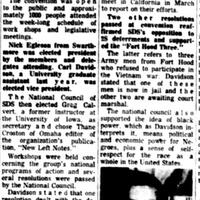Student Power!
Youth across the United States watched the events at the University of California Berkeley in 1964. That year Mario Savio and other students challenged in loco parentis rules and restrictions on student political organizing. The battles at Berkeley would rage for several years, but the events of that year proved instrumental and inspiring to many young students across the country.
In 1965, students at the University of Nebraska were expanding their own political freedom. Carl Davidson and Liz Aitken, after some wrangling with the administration, established a free speech forum called Hyde Park in the student union, held on Thursdays. [19] Hyde Park allowed anyone, right-wing, left-wing, centrist, even apolitical, people to speak on the microphone, usually with a limit of four minutes. Hyde Park became a staple of campus political discussion and often attracted a large crowd of listeners. Speakers such as UNL professors David Trask, Royce Knapp, and Dr. Marxer, countercultural icon Allen Ginsberg, student government candidates, and regular students spoke at Hyde Park over its years on campus.
The campus chapter of SDS even launched a political party for student government. [20] Modeling itself on the Mississippi Freedom Democratic Party, a civil rights party formed in 1964, the Campus Freedom Democratic Party made student rights on campus a major campaign issue and attempted to get candidates elected to the student government, the Associated Students of the University of Nebraska (ASUN). The CFDP proposed as its platform a Student Bill of Rights. Larry Grossman, CFDP candidate for Arts and Sciences senator, said the basis of the Bill of Rights was that "students should have the final say over all things that govern them outside of the classroom." CFDP candidate for president, Steve Abbott, said that were such a bill passed by student government and vetoed by the dean of Student Affairs, the student government would stage a walkout and demand new elections to show the students supported the bill. [21]
The Campus Freedom Democratic Party popularized the issue of student rights on campus, even forcing the main opposition party, Vox Populi, to put forward their own watered-down version of student rights. [22] Nevertheless CFDP managed to get only a handful of candidates elected, none of them to the executive positions. [23] However that did not mean the end of the issue. Steve Abbott continued to advocate for a Student Bill of Rights as a graduate student representative in student government, and the Fall 1966 editor of the Daily Nebraskan devoted a great deal of attention to student rights. [24]
During this time, Carl Davidson was collecting his ideas about student rights and student government. Drawing from the radical American labor tradition of the International Workers of the World and anarchist syndicalist ideas, Davidson wrote a series of essays which became famous within SDS nation-wide. The earliest of these, written while he was at UNL, was titled "Toward a Student Syndicalist Movement, or University Reform Revisited." The essay urged students to take one of two methods towards changing their schools, depending on how open their student government already was. One, they could form a Campus Freedom Democratic Party, as Davidson and others had done at UNL. Ideally the CFDP could push demands "in the form of a Bill of Rights or Declaration of Independence or both." If the demands were not met, Davidson said, the CFDP should "promptly abolish student government or set up a student-government-in-exile," followed by a variety of protest and civil disobedience. Or two, the students can form a Free Student Union. The FSU would serve as a parallel institution to the regular student government, encourage people not to participate in the student government, and eventually declare the student government defunct and make demands on the university administration. [25] The essay proved so popular that at the 1966 SDS National Convention in Clear Lakes, Iowa, he was urged to run for National vice president and won. Although he would come back to Lincoln occasionally, organizing for SDS nationally would take a great deal of Davidson's time from then on; he dropped out of grad school that summer and devoted himself to SDS. [26]


